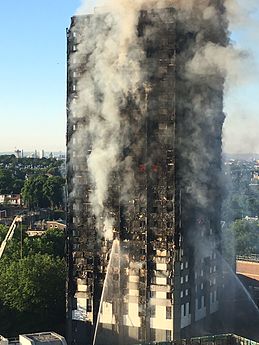By Eric King-
Criminal charges related to the Grenfell Fire is unlikely, after it was revealed it could take a few years before charges can be brought. Families of Grenfell victims could be forced to wait at least eight years after the tragedy to discover if anybody will ever be charged over 72 deaths.
Police have told relatives and survivors at a specially convened meeting that no decision on charges will be made until the completion of the second phase of a public inquiry into the disaster. The stage in the inquiry which includes the installation of flammable cladding prior to the fire on June 14 2017 will be examined. But the second phase is much more complex than the first, which took 16 months to complete.
New figures released by the Grenfell Inquiry show the second phase of the investigation into the disaster has unearthed 200,000 separate documents – ten times the number analysed in the first stage. The most worrying element is the difficult guidelines for prosecution used by the CPS that they must be confident beyond a reasonable doubt that a charge will lead to a conviction.
This means that in the absence of such confidence of a conviction, the CPS will be unlikely to press charges. Also, the chances are that if the Met were going to bring charges of manslaughter, they would have been expected to do so a long time ago.The extension of the investigation makes it look less likely that any charges will be brought.
Phase two will be split into eight separate ‘modules’, with 21 companies granted ‘core participant’ status along with more than 600 individuals.
Afrasehabi died on the 18th floor of the tower in west London, said: “It is one of the concerns we have that the police keep saying ‘we don’t want to bring charges until the files in the case are complete and we don’t want to miss anything’.
“But there is a big worry this will keep going on and on without anybody being charged. We have been given no indication of the timeline and I don’t think the judge can say.
“It is frustrating. Justice delayed is justice denied. Quite a few of us think charges should come sooner rather than later but they [police] keep saying they don’t want to miss anything. We are worried this is going to fall into the long grass.”
Nabil Choucair, who lost his mother, sister, brother-in-law and their three children – his three nieces – in the Grenfell inferno, said: “The investigation has to be done properly but it is taking a long time. It seems to be taking forever.”
The Metropolitan Police have been running a criminal investigation since the disaster unfolded, but want to analyse the findings from both phase one and phase two before completing its inquiries. Police files would then need to be passed to the Crown Prosecution Service (CPS), which could easily take up to two years to decide whether to bring charges.
The official report into the first phase – which only looked at events as they unfolded on the night – was very critical of the London Fire Brigade (LFB) and its commanders that Grenfell relatives hoped it would lead to a corporate manslaughter prosecution. Some have wanted to see senior officers charged with gross negligence manslaughter. However, Detective Superintendent Matt Bonner, who is leading the criminal inquiry, met with the families and survivors towards the end of last year and is understood to have stressed no charges could be considered until phase two is complete.
The first phase of the inquiry began evidential hearings in June 2018 and did not produce a final report, which castigated the LFB, until October this year, 16 months later. The damning indictment of the LFB forced the early retirement of Dany Cotton, its first ever female commissioner. The second stage is far more complex, looking at building regulations, the role of the council and cladding products and other technical issues.




